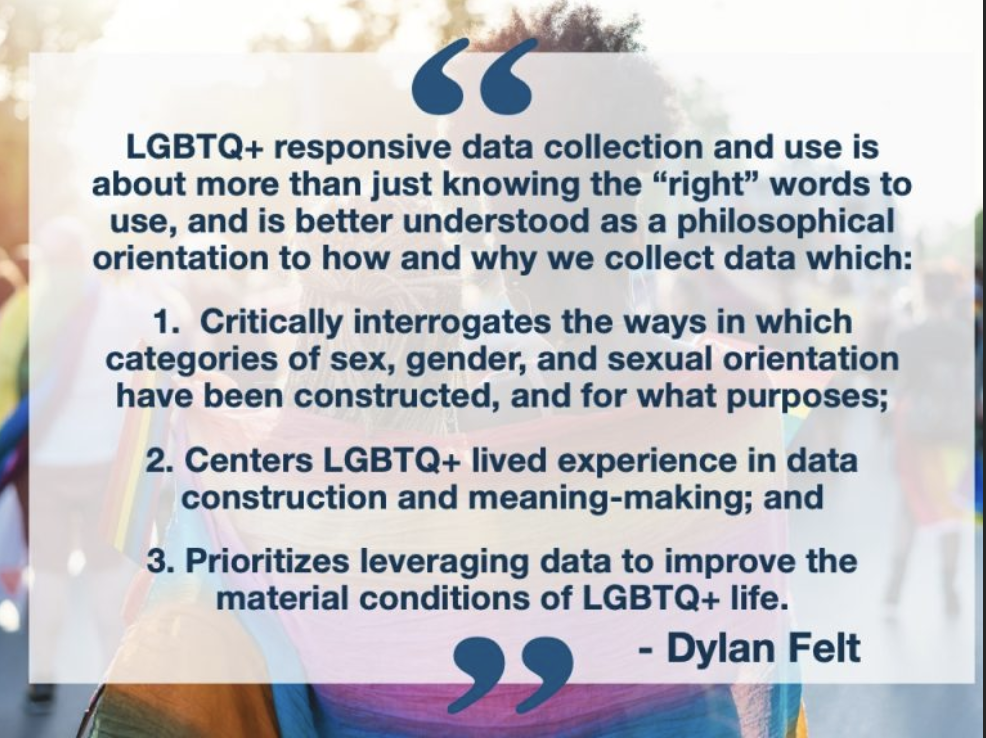Hi. We’re Alex Bauer, Dylan Felt, Amy Lippincott, Esrea Perez-Bill, Michael Petillo, JulieAnn Sickell, and Shepherd Tsosie. Throughout 2021-2022, a group of 7 LGBTQ+ evaluators worked together to craft an eStudy for AEA focused on philosophical, ethical, and methodological considerations in LGBTQ+ Evaluation practice. The eStudy is available from AEA, but today, we wanted to share a bit about some of the things we learned while crafting the session.
We framed this eStudy as a call to collectively building an LGBTQ+ Evaluation practice. Our team took an inquiry-based approach to both the development and delivery of the eStudy, framed around the question, “How can our work as evaluators help to advance LGBTQ+ peoples’ liberation?” Our intent was for the eStudy to help participants develop the theoretical as well as methodological skills necessary to conduct rigorous, affirming, liberatory work with LGBTQ+ populations through a combination of teaching styles including didactic lecture, group discussion, and hands-on learning. However, that core question was also an opportunity for reflection for us, and a challenge to think about what we understood the core work of LGBTQ+ Evaluation to be. It was also a call to think about how we could live by these ideas in our work together.
Some of the key lessons our team learned during this process included:
- Leading a workshop on LGBTQ+ Evaluation isn’t just about the content we share, it’s also about form! LGBTQ+ Evaluation calls for reflexive, collaborative approaches to evaluation, and the ways we teach it should mirror those philosophies. This means teachers need to be okay relinquishing control and a perception of expertise, and embracing collective, multidirectional learning.
- Facilitating active dialogue through ongoing meetings within the eStudy development team strengthened our ability to co-create the eStudy. Though consensus-based decision making can be hard, we did our best to embody a design process that embraced consensus and equal ownership. This meant that our development process took time, but in the end, we delivered something that we had all meaningfully contributed to.
- LGBTQ+ Evaluation is full of a lot of big ideas (see a screenshot from one of our slides below as an example)! Finding ways to make these feel grounded is essential. Asking participants to be vulnerable and share their own real-world LGBTQ+ Evaluation successes and challenges can help with this, but it requires making sure you establish a truly safe space for everyone.

During our development process, we compiled a few Rad Resources that we used as touchpoints and guideposts. We’d like to share those here with you as well:
- Link to the eStudy- https://www.pathlms.com/aea/courses/45625
- CARE Principles for Indigenous Data Governance (2019) from the Global Indigenous Data Alliance
- We All Count’s Data Equity Framework
- Jara Dean-Coffey and the Equitable Evaluation Initiative’s Equitable Evaluation Framework™
- Digital Transgender Archive’s Introductory Overview of Global Terms for Gender Nonconforming Practices
- The Misuses of “Biological Sex” by Katrina Karkazis. The Lancet (November 2019) 394 (10212).
- Mutual Aid: Building Solidarity During This Crisis (and the Next) by Dean Spade (2020)
- Anti-Oppression Resource & Training Alliance’s Navigating Conflict in Movement Organizations
- The Nonperformativity of Antiracism by Sara Ahmed. Meridians (2020) 19 (S1): 196–218.
The American Evaluation Association is hosting LGBT Issues TIG Week with our colleagues in the Lesbian, Gay, Bisexual & Transgender Issues Topical Interest Group. The contributions all this week to AEA365 come from our LGBT TIG members. Do you have questions, concerns, kudos, or content to extend this AEA365 contribution? Please add them in the comments section for this post on the AEA365 webpage so that we may enrich our community of practice. Would you like to submit an AEA365 Tip? Please send a note of interest to AEA365@eval.org. AEA365 is sponsored by the American Evaluation Association and provides a Tip-a-Day by and for evaluators. The views and opinions expressed on the AEA365 blog are solely those of the original authors and other contributors. These views and opinions do not necessarily represent those of the American Evaluation Association, and/or any/all contributors to this site.
